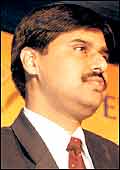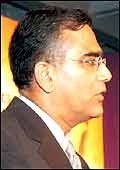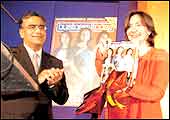|
|
No disagreements: (From L to R)
Ventures' Renuka Ramnath, Indian Bank's Ranjana Kumar, moderator
Siddhartha Basu, HDFC's Renu Karnad, Nicholas Piramal's Swati
Piramal and Spatial Access Solutions' Meenakshi Madhvani |
The
issue of business today featuring India's 25 most powerful women
in business on its cover was the first of its kind. The event to
mark its launch proved to be every bit as special as the issue itself.
"Are women CEOs more ethical than their male counterparts?"
was the topic to be debated by a five-member, all-woman panel at
the latest of BT-Electrolux Managing Tomorrow series event, held
at Delhi's Hyatt Regency on November 6, 2003. The elite panel comprised
Renuka Ramnath, CEO, ICICI Ventures; Ranjana Kumar, Chairperson
and Managing Director, Indian Bank; Renu Karnad, Executive Director,
HDFC; Swati Piramal, Director (Strategic Alliances), Nicholas Piramal;
and Meenakshi Madhvani, CEO, Spatial Access Solutions, the country's
first media audit outfit. Popular quiz master Siddhartha Basu was
the odd man out on the stage as he took up the mantle of moderating
the course of the debate.
Giving the event a headstart, Aroon Purie,
CEO, India Today Group, and the Editor-in-chief of Business Today,
said: "The liberation of women in India has been more graceful
than anywhere else in the world. The process is perhaps more important
than the economic reforms." The India Today Group CEO's remarks
were all the more significant considering the huge difference made
by women to the business he's in, the media. "It's a great
achievement for all of them to have scaled such heights in a society
as conservative as ours. May their tribe grow so that we have not
just 25 women, but 100 the next time round," he concluded.
 |
 |
"Women are excellent at multitasking,
both at home and the workplace"
Rajeev Karwal,
CEO & MD, Electrolux Kelvinator |
"It's a great achievement for
women, especially in a conservative society like India"
Aroon Purie,
CEO,
India Today Group |
Purie, along with Elizabeth Coffey, the renowned
leadership development expert and management consultant, released
the special issue. Later, Coffey took up cudgels on behalf of the
fairer sex. In the US, nearly two-thirds of new entrepreneurs are
women and they find it much easier to obtain funding for their ventures,
she said. This wasn't always the case, though. However, "because
of their sense of responsibility, their credit rating has now become
much higher than that of men", she pointed out. The same went
for women professionals. Xerox Corporation chose Ann Mulcahy for
the top job, mainly for her integrity, when faced with a reputational
crisis against the backdrop of two of her male predecessors being
indicted in scams.
That set the stage for the leading panelists.
Renuka Ramnath of ICICI Ventures kicked off the debate by saying
that ethical practice came intuitively to women. "Men tend
to adopt the principle of justice when looking at issues, while
women follow the principle of care-much the same way a mother cares
for a child."
She argued that women by nature are cooperative
and men competitive. "But women can be nurtured to become competitive."
It all boiled down to one's personal values, she continued. "I
look upon each employee in my organisation as my child. They have
entrusted their careers to my hands. I'm the custodian of their
progress. Does that mean you don't hurt anybody? No. You occupy
the CEO's chair and you are answerable to the stakeholders. But
striking a balance is important. Women operate more from the platform
of relationships," Ramnath concluded.
 |
| The unveilling: Aroon Purie with Mercer
Delta's Elizabeth Coffey |
Moderator Basu interjected that this position
was a mite ambivalent. The next speaker, however, Indian Bank's
redoubtable Ranjana Kumar, left no room for complaint on that score.
Kumar argued that since women donned so many hats, it left them
with too little time to be crooked. "Men have enough time to
relax and contemplate. Women don't have that luxury. How many of
us women are invited to parties and late night dinners? Women just
don't have that kind of exposure," she rubbed it in.
One disadvantage for women managers, she felt,
was the lack of role models. "Being pioneers, we have to be
extra careful. A single slip can put us in an awkward position,"
said Kumar. The bottomline: Women had too much on their hands to
be unethical.
| "You Always Need A Visionary At
The Top" |
|
|
|
|
Success secrets to keep you
ahead: Leadership guru Elizabeth Coffey (left) and Partner
Walter Elliot
|
| Elizabeth
coffey is no ordinary management guru. Besides being the author
of the bestseller Ten Things That Keep CEOs Awake, she is a
Director at Mercer Delta Consultancy, which works with CEOs
and other senior executives on change management issues. Recently,
she has also been invited by the Queen of Egypt to help the
country develop its next generation of leaders. Coffey was in
Delhi, along with her partner Walter Elliot, to conduct a workshop
on November 6, 2003, as part of the BT-Electrolux Knowledge
Management Forum.
In the audience were CEOs who wanted to upgrade their leadership
skills and senior execs who'd in the near future find themselves
at the top job.
Coffey classified leaders into two categories. The mythic
and the operational leaders. "Although managing day-to-day
operations successfully is important for a company, it's perhaps
more important to have a leader who can set a vision for the
long term," she said. To identify their leadership qualities
and deficiencies, the participants were given short, written
exercises. In these stressful times, it is important for leaders
to balance their professional and personal lives. Shashi Ullal,
a management consultant, spoke to the participants about the
importance of stress relief exercises like pranayama and realistic
target setting.
Market research expert Rama Bijapurkar shared consumer insights
and asked the leaders to make their companies consumer relevant,
and not just consumer led. "India will always be a country
where a lot of people will consume very little. But even that
adds up to a lot," she said.
|
Next was Renu Karnad of HDFC. She said women
were still outnumbered by men in most sectors other than financial
services and media. "We have always been the nurturers, transferring
civilisational values. What you teach your kids at home is what
you practice in the office. For us, the office is an extension of
home." Karnad insisted that women in general displayed a greater
sense of responsibility. To underscore this sentiment, she said
HDFC preferred to make the wife the borrower while giving out home
loans,. "Ninety-nine per cent of the times you get your money
back if that's the case," claimed Karnad.
The next speaker, Swati Piramal contended that
while it was true that none of the BT 500 companies had women CEOs,
too much should not be read into this since they made a more-than-significant
contribution to the small and medium enterprises. "Men have
created a civilisation that follows their own tendencies. Women
have to work within the narrow confines of this sphere." She,
however, agreed with the other panelists that women were far better
at long-term relationships than men.
Spatial Access' Meenakshi Madhvani pushed the
point further, saying: "It pleased me no end to see that not
a single woman was involved in the recent 20 big scandals around
the world. In India too, no women CEOs or managers were involved
in any corporate scam," she said. "That," Madhvani
said, "is because women tend to be as concerned about the means
as the ends." She regretted the fact that women managers were
constantly under the microscope in the male-dominated world. "If
a man makes the same mistake, I'm sure he'll be forgiven. Our actions
invite constant scrutiny and comment." Her closing remark that
women were definitely more idealistic than men and could be relied
upon to do the right thing, summed up the mood of the gathering.
The verdict was unanimous. The fairer sex emerged the winners hands
down.
| "Think From Your Heart" |
 |
| All for change: GE India's Bayman |
The panelists weren't let off
the hook so easily. An eager audience fired a volley of questions
at them. The responses were quick and sharp. Here's a sample.
Suhel Seth, CEO, Equus Redcell: I worship women. I have
been listening to the panelists in rapt attention. Can you
tell us men what we need to do to be like women?
Renu Karnad: Think what you'd do if you were on the other
side of the gender divide. Just go by your conscience.
Renuka Ramnath: Think, act, and work from your heart. Then
you'll get closer.
Siddhartha Basu: If you look at certain areas like politics,
have women proved themselves to be more ethical than men?
Swati Piramal: Politicians are genetically different from
all other species.
Meenakshi Madhvani: There was a study done on rural women
leaders. It was found that villages with women sarpanchs showed
dramatic development. Women were less corrupt in siphoning
off money.
Scott Bayman, CEO, GE India: What would be your advice
to the young woman manager? What should she do to progress?
Ranjana Kumar: She should be thorough. She has to constantly
upgrade herself. She has to be totally professional. Only
then will she earn the respect of her peers.
|
|
